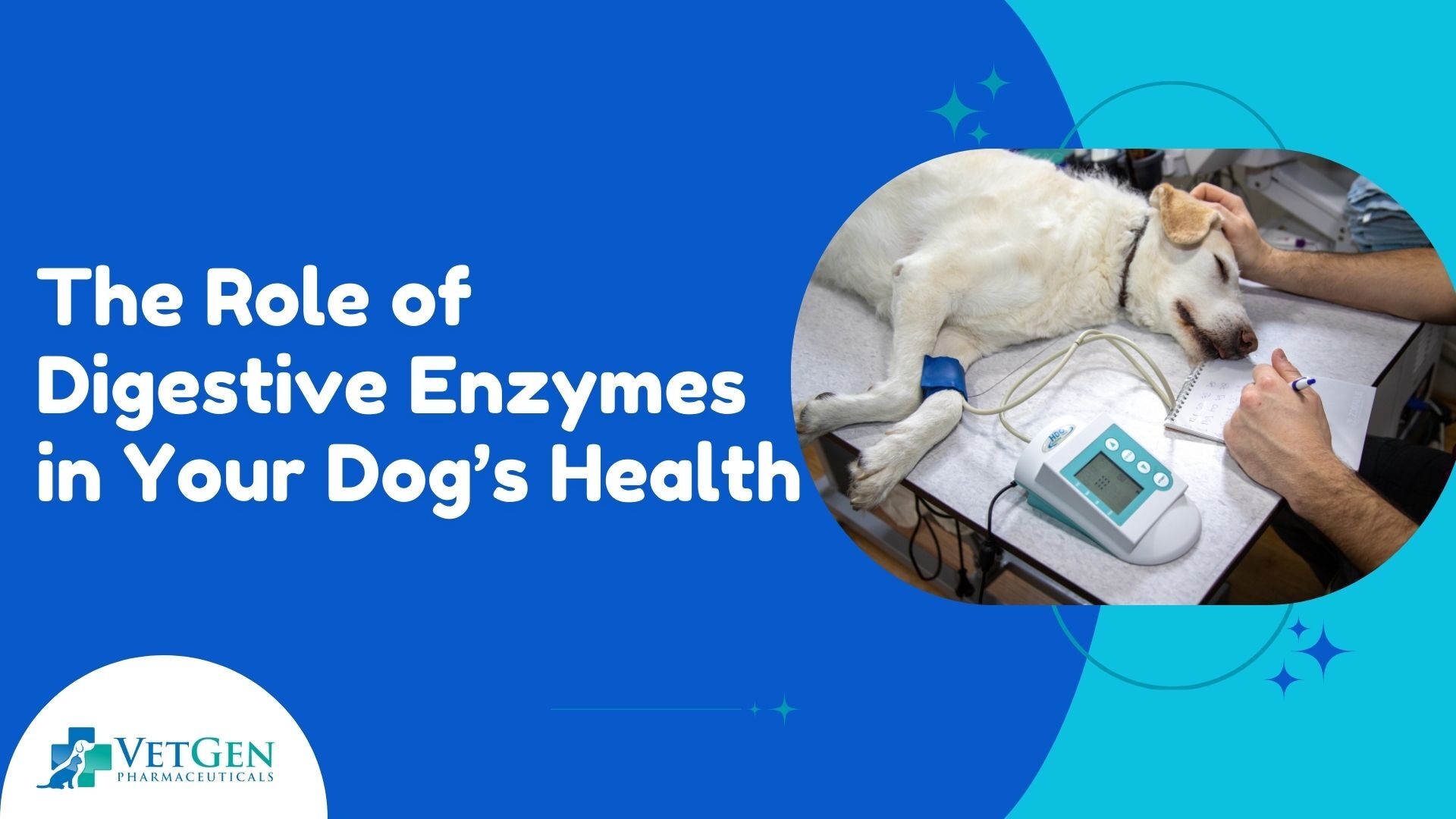The health of the gastrointestinal tract is one of the most important aspects of your dog’s general health. They have effects on their energy, their coat, their attitude, and their immunity to certain diseases. Any responsible dog owner will agree that understanding how the dog’s digestive system works is crucial in providing care to your dog.
Among the most important factors to keep this aspect of health intact are the digestive enzymes. These specialized proteins facilitate in digestion of food and a good number of nutrients pass through the body of your dog in an orderly manner. In this blog, you will learn about the role of digestive enzymes in your dog’s health and why they are necessary.
What Are Digestive Enzymes?
Digestive enzymes are physiological proteins secreted in the human and animal body by the pancreas gland or other tissues. Their main role is to reduce the size of the food that your dog consumes to a size that can easily be absorbed into the body. These enzymes fall into several categories, each focusing on a specific type of nutrient
- Proteases: Enzymes that catalyze hydrolysis of proteins to their constituent amino acid.
- Amylases: Enzymes that break down carbohydrates into simple sugars.
- Lipases: Enzymes that facilitate fats into fatty acids.
- Cellulases: Enzymes that aid in the digestion of plant materials.
The digestive enzymes in a healthy dog are produced by the pancreas. However, age, diet, or other diseases influence enzyme secretion causing various digestive issues.
Digestive Enzymes in your dog’s health:
The importance of digestive enzymes in your dog’s health is paramount. These enzymes help in the digestion of complex carbohydrates, fats, and proteins and the absorption of nutrients. The dog is subjected to malnutrition, loss of weight, and several other disorders such as bloating, gas formation, and diarrhea if the dog fails to secrete enough digestive enzymes.
- Nutrient Absorption: Digestive enzymes work to decompose food so your dog is in a position to absorb some nutrients required by the body. Proteins, fats, carbohydrates, vitamins, and minerals are all chemically altered so that they can be transported to the cells of the body where energy for metabolism, tissue repair, and other purposes are needed.
- Supporting Immune Function: Some studies show that seventy percent of a dog’s immune system is in the gastrointestinal tract. Digestive enzymes are healthy for the gut as they discourage the unwanted growth of bacteria that are unlawful and assist in the assimilation of nutrients that bolster the immune system.
- Improving Gut Health: Abnormal gut bacteria are found in poor digestion and this is referred to as dysbiosis. This may lead to chronic inflammation, and other problems within the body when the levels are skewed. Digestive enzymes in your dog’s health help maintain a proper balance of gut flora within your dog thus promoting the right gut health.
- Reducing the Risk of Pancreatitis: Low enzyme levels can put a dog at increased risk for developing pancreatitis, which is characterized by inflammation of the pancreas and can be very painful to the animal. To prevent inflammation of the pancreas, one can take digestive enzymes as supplements to decrease the load on the pancreas.
- Enhanced Energy Levels: If your dog is suffering from poor digestion then he is not going to be charged up or have a lot of energy. If there is improved nutrient assimilation, dogs will be more active and vibrant. This is particularly important for older animals with decreased enzyme synthesis capabilities which can be resolved with the use of additional supplements.
Symptoms Your Dog Might Benefit from Digestive Enzymes
In the case of many dogs, they will be able to secrete adequate amounts of digestive enzymes on their own, but there are exceptions. Dogs with digestive enzyme deficiencies may exhibit the following symptoms:
- Chronic gas or bloating
- Diarrhea, loose stools, or constipation
- Eating normal meals and still losing weight
- Poor coat quality
- Lethargy or low energy levels
If any of the signs highlighted are observed, then it is high time to see a veterinarian. Enzyme supplements often can help in many cases and make the life of your dog much better.
Nutrition Guidelines that Will Help in Supporting Digestive Enzymes
Besides supplementation, there are other ways your dog can receive enzyme boosts through wholesome dieting. Indeed, vegetables, lean meats, etc. are full of digestive enzymes when they are raw and unprocessed. For instance, pineapples and papayas contain enzymes, bromelain and papain respectively that help in the digestion of proteins.
Making sure your dog eats a healthy diet, and avoiding feeding them junk food will be helpful to their digestive system. Moreover, one should consume products containing probiotics such as yogurt, to enhance the positive effect on digestion.
Conclusion
Digestive enzymes are part and parcel of your dog’s health as they are responsible for the digestion of food and nutrient absorption. Knowing these enzymes and how to identify deficiencies is key in acting early to maintain your dog’s gastrointestinal tract and overall health. You should seek advice from your veterinarian to find out whether your dog can benefit from enzyme supplements and if they have signs of poor digestion.
Frequently Asked Questions
When does a dog need digestive enzyme supplements?
Be sure to use digestive enzyme supplements if your dog is suffering from issues like diarrhea, bloating, weight loss, or lethargy in dogs. Please ask your veterinarian for a proper diagnosis.
Is it safe for my dog to take human digestive enzyme supplements?
One should avoid giving your dog human digestive enzyme supplements as they may contain ingredients toxic to your pet. Specialized formulations are designed with your dog’s digestive structure in mind. It’s always wise to call your vet before adding any supplements to your pet’s diet.
How long does it take for the digestive enzyme supplements to show results?
Many dogs start to see changes in their conditions in a few days to weeks after beginning enzyme supplementation. This can however change depending on the level of complication of the digestive problem and the general health state of your dog.






